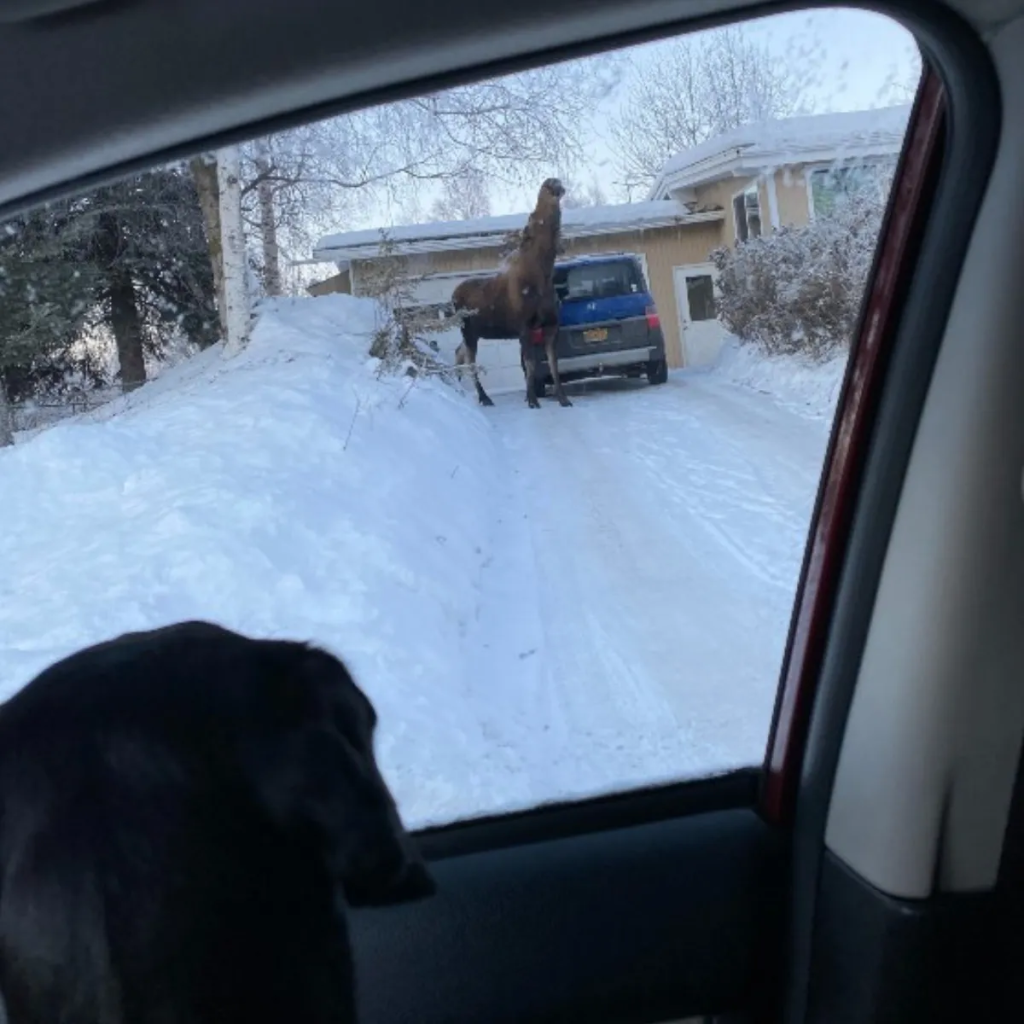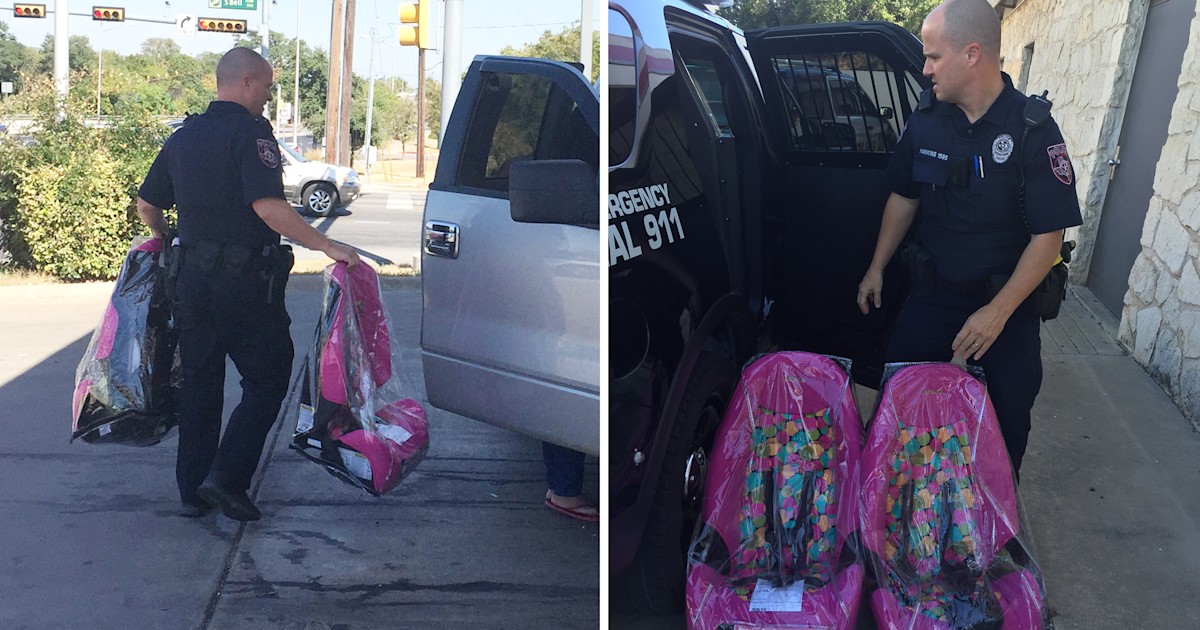
James Clark and his loyal dog, Starbuck, were simply making their way to their friend Ted’s house when the unexpected happened. As they pulled into the driveway, Starbuck suddenly froze, her eyes locked on something massive standing in their path. Her body stiffened as though she were ready to spring into action. Was this a giant dog? A stranger intruding on their territory? Or something else entirely?
Clark quickly realized what it was — a moose. For him, an Alaskan native, these towering animals are not an unusual sight. But for Starbuck, whose protective instincts always kick in first, the encounter was cause for confusion. She tilted her head, trying to assess the situation, uncertain if she should leap into defense mode for her human.
Amused, Clark grabbed his phone to snap a photo. At first, it was just for fun, a quick snapshot of a routine Alaskan moment. But when he looked at the picture later, he couldn’t stop laughing. The angle he had captured was so odd that the moose didn’t quite look like a moose at all. Instead, it resembled something magical — a bizarre creature straight out of a fairytale. When he shared the photo online, the internet had a field day.
“My favorite reactions have been from people who explain what they think they saw in the photo,” Clark told The Dodo. “One person thought it looked like a seal centaur. Others thought it looked like an entirely new species. The imagination people have when they see this picture has been hilarious.”

Of course, there was nothing mystical about the animal. It was just a moose reaching up on its long legs to nibble on the buds of a nearby birch tree. From Clark’s vantage point in the car, though, her elongated body and awkward posture gave the illusion of a fantastical hybrid creature.
“I grew up in Anchorage, and moose encounters here aren’t uncommon, especially in the winter when they forage for scarce food,” Clark explained. “The moose in this picture was eating buds off of a birch tree. They spend a lot of time browsing like that during colder months when other options are limited.”
For Starbuck, though, the moment was less about whimsy and more about wariness. The dog’s eyes stayed locked on the moose as she growled softly under her breath, unwilling to let her guard down.
“My dog was big mad at what she probably thought was a large doggo,” Clark said with a laugh. “She growled but didn’t bark. She definitely wasn’t a fan.”
Starbuck’s confusion was understandable. After all, moose can tower up to seven feet at the shoulder and weigh well over a thousand pounds. To a dog, especially one tasked with guarding her person, they could easily be mistaken for an oversized rival. Luckily, this moose seemed completely uninterested in the humans and their protective pup. She was far more focused on her leafy snack than anything else happening in the driveway.
Eventually, with no fuss, the moose sauntered away from Ted’s driveway and into the neighboring yards, continuing her slow, deliberate search for food. For her, it was just another ordinary day in Alaska. For Clark and Starbuck, however, the encounter turned into an unexpectedly funny memory, immortalized by that perfectly mistimed snapshot.
The photo quickly spread across social media, where thousands of people joined in on the fun of trying to identify what sort of creature Clark had “discovered.” Was it a moose? A horse-dog hybrid? A seal centaur? The guesses were as endless as they were creative.

In a world often filled with heavy news, the image brought a dose of much-needed humor and lightness. People from all over the globe, many of whom had never even seen a moose in real life, found themselves laughing together at the same optical illusion.
Clark admitted that while encounters with moose are routine for him, it was fun to be reminded of how unique Alaska can seem to outsiders. “Living here, you kind of get used to seeing moose around,” he said. “But I love that people from other places get such a kick out of it. It makes you appreciate how special these everyday moments really are.”
As for Starbuck, she still hasn’t made peace with moose encounters. Protective and loyal, she’ll likely always view them as suspicious intruders rather than the gentle foragers they usually are. And Clark wouldn’t have it any other way — after all, her protective instincts are part of what makes her such a faithful companion.
In the end, what could have been just another routine moose sighting turned into something unforgettable. With a single snapshot, James Clark captured not only the amusing reality of life in Alaska but also the joy of seeing the world through fresh eyes. What to him was ordinary became extraordinary when shared with others, proving once again that sometimes the most magical moments are hiding in plain sight — or in this case, standing right in the driveway, chewing on a birch tree.
When Duty Turns Into Compassion

Sometimes, the most powerful acts of kindness happen in places where we least expect them—on an ordinary street, in the middle of an ordinary day, during something as routine as a traffic stop. For OfficerKevin Zimmerman of the Milwaukee Police Department, one such moment unfolded when he pulled over Andrella Jackson, a Wisconsin mother just trying to make it through the daily struggles of life.
At first, the stop seemed straightforward. Jackson’s car had a registration issue, and by standard procedure, Zimmerman could have written her a ticket. For someone already struggling financially, a fine like that would have been just one more heavy burden on a long list. But what happened next turned a routine encounter into a story that touched thousands of people.
When Zimmerman approached the car, he noticed two little girls sitting in the back seat. They looked up at him with shy, curious smiles—the kind of smiles children give when they don’t quite understand what’s happening but sense that it’s serious. In that small moment of eye contact, something shifted for Zimmerman. Instead of focusing on paperwork, he began to see the story of a family, the reality behind the situation.

Then he noticed something alarming: neither of the children was in a car seat. To any police officer, this was a safety violation, and in most cases, it would have resulted in a citation. But instead of reacting with frustration, Zimmerman asked Jackson why. Her answer was both simple and heartbreaking. She wasn’t being negligent—she was making an impossible choice. Every dollar she had was going toward buying warm clothes for her kids to survive Milwaukee’s brutal winter. With bills, food, and other essentials to worry about, car seats were simply beyond her reach.
Zimmerman could have chosen the easy way—issue the ticket, record the violation, and move on. But he didn’t. As a father himself, he couldn’t stop thinking about those little girls. He knew the risks of driving without proper car seats, but he also knew what it felt like to want the best for your children and not have enough to give them everything they deserved. Instead of letting the stop end on a note of punishment, he decided it would end with compassion.
Later that day, Zimmerman went to Walmart. Not as a police officer, but as a dad, a neighbor, and a fellow human being. Out of his own pocket, he paid $75 for two brand-new car seats. And he didn’t stop there—he also picked up coloring books and stickers, little tokens that he knew would bring joy to the two girls who had smiled at him so sweetly just hours earlier.
When he returned to Jackson’s home, she was stunned. She hadn’t expected help, especially not from the man who had pulled her over earlier that day. Zimmerman carried the boxes inside, sat down with her, and carefully installed the seats himself. He didn’t just drop them off—he made sure everything was set up safely. He even helped her fill out the recall cards, ensuring the seats would remain secure for years to come.

For Jackson, this was about so much more than avoiding a ticket. It was about dignity, compassion, and the kindness of a stranger who saw her not as a problem to correct, but as a person carrying heavy burdens. In her daughters’ eyes, it wasn’t just about sitting safely in the back seat—it was about feeling seen, valued, and cared for.
Word of Zimmerman’s gesture quickly spread throughout Milwaukee and beyond. Many in the community praised him as a role model, pointing out that this is what true service looks like. Others admitted that his story challenged their assumptions about law enforcement, showing that behind the badge, there are individuals capable of extraordinary empathy.
Zimmerman himself didn’t see it as anything heroic. In interviews, he insisted that what he did was simply what anyone should do when they have the chance to help. But the truth is, not everyone would have chosen the same path. Many officers in his position would have issued the ticket and gone on with their day. Zimmerman chose instead to lead with heart, and that decision changed the story for one family forever.

Stories like this remind us that justice is not always about punishment—it’s about balance, fairness, and humanity. Sometimes, the greatest service an officer can provide is not to enforce the law to its strictest letter, but to recognize when compassion will have a greater impact than a fine ever could.
For the Jackson family, two new car seats meant more than just safety—they meant peace of mind, dignity, and a renewed sense of hope. For the community, Zimmerman’s actions became a symbol of what it means to protect and serve not just with authority, but with kindness. And for Zimmerman himself, it was a reminder of why he put on the uniform in the first place: not simply to enforce rules, but to make a positive difference in people’s lives.
Sometimes, compassion is the most powerful form of justice. And sometimes, the smallest acts—a trip to Walmart, a $75 purchase, a helping hand—can echo far beyond the moment, inspiring countless others to see the world with softer eyes and a braver heart.




